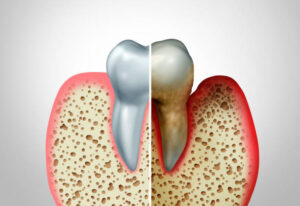 Cavities aren’t the only threat to dental health. Gum disease is also a leading cause of tooth loss and it can affect your overall wellness negatively. The Centers for Disease Control and Prevention reports at least 50% of adults have a form of the infection. Traditionally, scaling and root planing are used to treat gum disease, also known as a “deep cleaning.” However, Arestin is often used along with scaling and root planing to stop the infection in its tracks. Here’s how it can restore your gum health.
Cavities aren’t the only threat to dental health. Gum disease is also a leading cause of tooth loss and it can affect your overall wellness negatively. The Centers for Disease Control and Prevention reports at least 50% of adults have a form of the infection. Traditionally, scaling and root planing are used to treat gum disease, also known as a “deep cleaning.” However, Arestin is often used along with scaling and root planing to stop the infection in its tracks. Here’s how it can restore your gum health.
What Causes Gum Disease?
Gum disease is a preventable infection that’s caused by poor oral hygiene habits, like not flossing every day. Bacteria in plaque and tartar buildup infect the gum tissue. Gingivitis, the earliest stage of the infection, causes red, swollen, and bleeding gums. Deep periodontal pockets can occur with no treatment, trapping bacteria near the tooth roots. Over time, it can destroy the supporting structures of your teeth, causing them to loosen and fall out.
Bacteria from the infection may also enter your bloodstream through the pressure of regular chewing. Researchers have found several links between advanced gum disease and various health issues, including heart disease, Alzheimers, diabetes, and preterm delivery.
Treating Gum Disease with Arestin
Arestin is part of a class of drugs called tetracycline antibiotics. It prohibits the growth of bacteria and is released slowly over the course of several weeks. After cleaning your periodontal pockets and smoothing your root surfaces, your dentist will place the medication in the tooth pockets.
You mustn’t touch the area for at least 7 days. Your dentist will instruct you to skip flossing for at least 10 days. They will also advise against eating hard, crunchy, or chewy foods for about 1 week. It’s best to avoid anything acidic or spicey to prevent discomfort.
Researchers have found a 22% reduction in pocket depths after 9 months of treatment. It is also 20% more effective at reducing bacteria and 2 times more effective at treating bleeding gums.
Is Arestin Right for You?
Only a trained dental professional can determine if Arestin is right for you. Let your dentist know if you’re allergic to minocycline or tetracyclines. Arestin isn’t recommended for pregnant or nursing women. It isn’t suitable for children because it can discolor their permanent teeth.
Your dentist will examine your mouth and learn more about your health history to create a safe, effective treatment to restore your gum health. With regular dental care and good oral hygiene at home, you can prevent the infection from recurring.
About Dr. Peter Hammes
Dr. Hammes achieved his dental degree from the University of Illinois-Chicago and has completed additional training in various specialties, like oral surgery, general dentistry, and periodontics. He is a proud member of many professional organizations, including the American Dental Association. Request an appointment through his website or call his office at (312) 820-1717.



